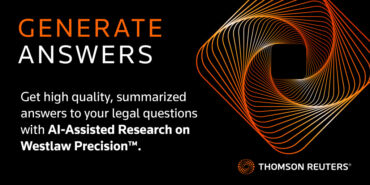Brands of all varieties like to claim that their products are critical to making you more “efficient.” But efficiency can mean many different things depending on your industry or objective. For some, it’s moving from spreadsheets to software systems. For others, it’s a riding lawnmower instead of a push mower. Defining “efficient” — when it comes to tasks a human does rather than a machine — is challenging.
So, what does it mean to be an efficient law firm and attorney?
You answer client questions quickly
Client service has always been important, but client expectations continue to increase. They expect answers quicker than ever. With the right legal research technology, you can give them the answers they need. It also means you avoid the onslaught of frantic emails or texts if the answers they were expecting yesterday still haven’t come today.
You skip the (search-results) sifting
When searching online for case law or secondary sources, do you have time to go through hundreds of results? Is that one even applicable to my case? Is this one accurate? Can I trust that source?
No. No, you don’t have the time.
When you have trusted legal research tools, you get to skip the sifting and vetting because you know everything you’re seeing is accurate and up to date. Which means you get to the answers you need faster.
Your case strategy is based on data
When you’re crafting a case strategy, current and accurate data might be your most important resource. From understanding your judge’s tendencies in the handling of matters like yours to having historical insight into your opposing counsel and their client, data is frequently the key a favorable outcome. Instead of trying to create a strategy based on best guesses and word-of-mouth experience, build your case with data.
Using Litigation Analytics, you can easily access information that will help you build a stronger strategy because you have insight on all the players connected to your matter such as:
- Example motions your judge has granted for a specific case type
- Opposing counsel’s experience with and approach to similar matters
- The amount and type of litigation the company your opposing counsel is representing has been involved in
- Discover the law firms currently representing a company you are hoping to make a client in the future
Knowing what may make your case stronger from the outset saves time and energy every step of the way.
Your clients are in the know
The same data that helps you build a better case strategy can also be used to better educate your clients. The more information they have on timing, costs, and possible outcome, the more comfortable they feel with the process. Level-setting at the beginning can help them feel confident with you leading the charge. That confidence and transparency can lead to fewer questions and hard conversations along the way — freeing up your time so that you can invest your efforts into providing a successful outcome.
You get up to speed fast
When a long-time client asks you to take on a tangential matter — one that isn’t as familiar to you — you say yes. While you may not claim to be an expert on the matter, you don’t necessarily have to be. With Practical Law, you have the expertise and legal know-how of hundreds of attorneys at your fingertips, so you can get up to speed on an unfamiliar area of law faster. You get to tap into their knowledge which compliments yours.
You don’t have to waste time trying to find up-to-date templates and standard documents. You aren’t spending hours or days getting up to speed on something — regretting the moment you decided to take this case.
Instead, you got to say yes to your client — and continue fostering that relationship.
Efficiency means peace of mind
Those are examples of what it means to be an efficient attorney. But how will efficiency impact your firm and its quality of work? Your life? What does that look like?
It’s leaving work behind for the day at a decent time. It’s not feeling guilty that you’re missing something when you attend your child’s baseball game. It’s confidently turning in for the night, knowing you’ve done everything you can for your clients.
Experience efficiency firsthand with best-in-class leal research tools.









